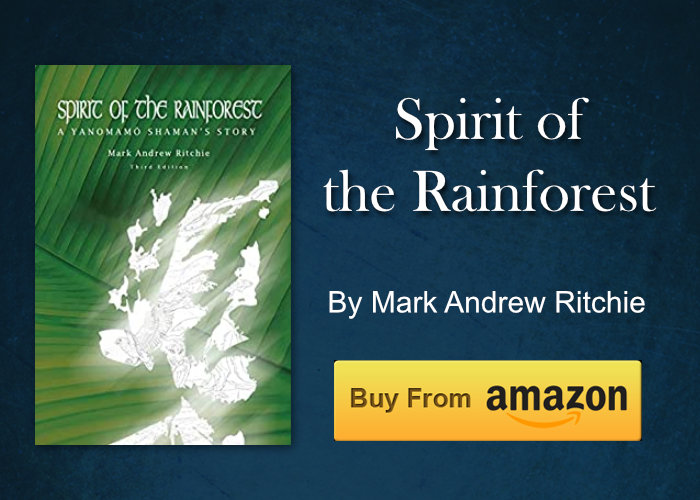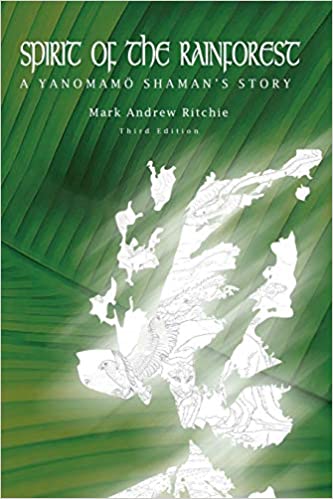The Spirit of the Rainforest by Mark Andrew Ritchie is one of those books I am constantly either referring to or recommending. I have bought several copies but at this very moment it is missing from my bookshelf after giving away my last one. Not only is this an engaging and completely true story, but it is one that every Christian should read.
As can be seen on this site, I have spent quite a bit of time reading about spiritual warfare and developing discerning of spirits. The book went on my wish list after coming across some random mention on another review, however it was on my “get to some day” list for some time.
I bought this book mainly because I’ve been reading about spiritual warfare and deliverance for the past couple of years and this is an account of a culture that sees into the spirit world, the “unseen realm,” as a matter of course. The other thing that interested me in the book was the debate going on in the comments where, I believe it was Shoefoot himself, that refuted some of the claims against it.
It’s interesting for several reasons. It makes you reconsider what the impact Westerners truly have on the societies they are helping. One thing is very clear is that as it states in 1 Corinthians 13, works (and help) without love is nothing. Going in, thinking we are “above” them without befriending and walking along beside them is meaningless.
The story is an account of a group of Yanomamo Indians through several generations told from the point of view of the shaman, Jungleman. It is a harsh and brutal society, the worst actions prompted by their spirit guides. That is part of the uniqueness of the account, that the shamans step from one world to the next like walking through a door. Often that spirit world interjects itself uninvited.
Beyond staying alive, the driving force behind the culture is one of revenge, getting one up on their enemies. The savage rape and murder that is a standard practice as recorded in this book is confirmed in other first person accounts.
The account shifts when Shoefoot, the apprentice of Jungleman, makes the decision to follow Christ, and in doing so, “throws away his spirits.” This begins a clear demarcation between those living in brutality and the new Christ followers who form a new village called Honey Village.
This is not written as an evangelical text at all. It is all just very straightforward, but the underlying message is one of transformation through Christ.
It was also interesting to read in the appendix about the push back from people reading it (you can see some of in the reviews and comments on Amazon as well.) I’m not sure what bothers people more about the book, that it paints an unflattering picture of anthropologists and their exploitation and observing the people like they were animals or that it so clearly proclaims the message that Jesus saves.
In the appendix, the author relays an exchange between Shoefoot and a college student when Shoefoot came to the U.S. for a tour. The student asked, “Why can’t you get rid of the spirits without being religious?” To which Shoefoot replied, “I don’t know any other way.”
Because in their culture, after hosting the spirits throughout their life and following their directions, once they were done with you they killed you. Jungleman resisted Jesus, even though he felt the stirring in his spirit every time he visited the Christ followers in Honey Village year after year, until the moment his spirits turned on him and tried to kill him. Then he called on Jesus.
There are so many clear illustrations of spiritual principles in the book that it’s hard to remember that it wasn’t written as a book for spiritual development. Some things that stood out to me:
~ Jungleman said “When you spend time with your spirits, more will come.” It is good to remember that when we refuse to let go of thoughts and actions outside of God’s will, the unclean spirits we are making room for in our lives call their friends.
~ The Yanomamo believers understood very clearly, probably better than the Western church does, that when you decide to follow Jesus you have to “throw away” the old spirits. “Therefore if any man be in Christ, he is a new creature: old things are passed away; behold, all things are become new.” 1 Corinthians 5:17 One of the Yanomamo believers identified very quickly when a professed Christian with hidden sexual sin was in their midst while the Western believers were completely unaware, because they recognized the spirit. They didn’t understand how someone could be a Christian and still have those spirits.
Good question.
~ The story clearly illustrates the lie of the demonic. Their spirits claimed to be helping them while they were wreaking havoc and destruction in their lives. They had to hide in the jungle, walking from place to place starving, because they had attacked another village and were in fear for their lives. The children were fed last and the old and weak were left to die alone.
Again, this isn’t a Christian book, but it is a book about Christ because he is the true hero of the story. In the appendix, the author shared that when the book was first published several Christian organizations pulled back from promoting it because some people felt there was too much violence, rape, and murder in it. The incidences are written factually, not salaciously.
To that I would also say, have you read the Bible? Specifically Judges 20 and 21? This book reminded me exactly of that, what society looks like when everyone does what is “right in his own eyes.”
Mark Andrew Ritchie. Spirit of the Rainforest. Second Edition (Chicago, IL: Island Lake Press, 2000) 288 pages.
Video Review of Spirit of the Rainforest








Trackbacks/Pingbacks